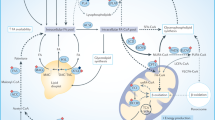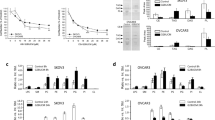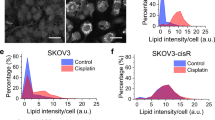Abstract
Growth of cells in vitro in the presence of fatty acids can alter the membrane composition and hence fluidity and permeability. Exposure of both doxorubicin (2780AD) and cisplatin (2780CP) resistant human ovarian cell lines to non-toxic concentrations of polyunsaturated fatty acids (gamma-linolenic acid and eicosapentaenoic acid) either before or during exposure to the cytotoxic drug did not modulate drug sensitivity. However, the fatty acids were toxic in their own right. Whilst the ovarian cell lines 2780AD and 2780CP showed a small degree of cross resistance to both fatty acids the doxorubicin resistant breast cell line MCF7/Adr was slightly more sensitive than MCF7. When the interactions between the polyunsaturated fatty acids and cytotoxic drugs were analysed by the isobologram method the toxicities were shown to be additive. The combination of polyunsaturated fatty acids and cytotoxic drugs may have clinical potential provided that the normal tissue toxicities of the two treatments are not additive.
This is a preview of subscription content, access via your institution
Access options
Subscribe to this journal
Receive 24 print issues and online access
$259.00 per year
only $10.79 per issue
Buy this article
- Purchase on Springer Link
- Instant access to full article PDF
Prices may be subject to local taxes which are calculated during checkout
Similar content being viewed by others
Author information
Authors and Affiliations
Rights and permissions
About this article
Cite this article
Plumb, J., Luo, W. & Kerr, D. Effect of polyunsaturated fatty acids on the drug sensitivity of human tumour cell lines resistant to either cisplatin or doxorubicin. Br J Cancer 67, 728–733 (1993). https://doi.org/10.1038/bjc.1993.133
Issue Date:
DOI: https://doi.org/10.1038/bjc.1993.133
This article is cited by
-
Lipid reprogramming induced by the TFEB-ERRα axis enhanced membrane fluidity to promote EC progression
Journal of Experimental & Clinical Cancer Research (2022)
-
Isolation of methyl gamma linolenate from spirulina platensis using flash chromatography and its apoptosis inducing effect
BMC Complementary and Alternative Medicine (2015)
-
Nutrition Therapy Issues in Esophageal Cancer
Current Gastroenterology Reports (2012)



